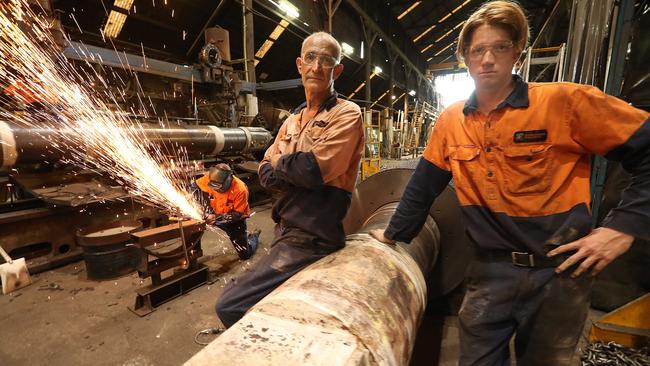Power bills make it a big call to engineer a future
A 70 per cent increase in the power bill for Bundaberg Walkers Engineering could be enough to pull the plug on the business.

It is one of the oldest foundries in Queensland, but a 70 per cent increase in the power bill for Bundaberg Walkers engineering could be enough to pull the plug on the business after 131 years.
Employing more than 100 people in the city north of Brisbane, Bundaberg Walkers is a major builder of sugarcane mills and machinery. Owned by Bundaberg Sugar, the foundry fears it won’t be able to compete with growing international rivals because of electricity prices that have more than doubled since 2008.
A new tariff scheme under the state-owned electricity providers is now set to hike its annual power bill from $1 million to $1.7m from next year. Like many regional businesses in Queensland, the manufacturer is at the mercy of state-owned electricity suppliers which last year delivered the state Labor government $1.2 billion in revenue.
Hinkler MP Keith Pitt, a former electrician with Bundaberg Sugar, said the struggle was indicative of the need for the Nationals’ proposed “big stick” divestment legislation targeting energy companies that misuse their market position. Mr Pitt last week wrote a letter, signed by five other Queensland MPs, to Nationals leader Michael McCormack, demanding the government put the legislation to a vote in parliament.
They also demanded the government underwrite construction of a coal-fired power station in regional Queensland, to help bring down wholesale electricity prices.
Walkers pays 28c per kilowatt-hour for its electricity but that is expected to rise to 48c from next year because of new demand tariffs. A free audit provided by the state government failed to find a cheaper solution for the company.
Bundaberg Walkers told The Australian the looming hikes could force its closure. “Currently available 2020 demand tariffs will make it impossible for us to operate in Queensland,’’ the company said in a statement.
Bundaberg Sugar chief financial officer Leone Aslett said more than 50 per cent of the foundry’s revenue came from products exported overseas, where they face growing competition from suppliers in Thailand, China and India.
“We have the expertise and the know-how but they are also building up their skills,” she said. “If our power prices are so expensive, it makes it very hard to compete.”
Ms Aslett said manufacturers across Queensland were facing similar issues and had raised the issue with the government for years. “I don’t think they put thought into how it would affect us,” she said.
Paul Stringer, 56, and his son Eli, 15, both work at the mill. Paul, who started work at the foundry in 1983, understands the complexities of the national debate around renewables and fossil fuels, but fears its impact on his livelihood and community.
“I understand we need to go green, but it shouldn’t have to be at the expense of shutting us down,” he said. “The high price of electricity adds to our end prices, so how can that be a level playing field.”



